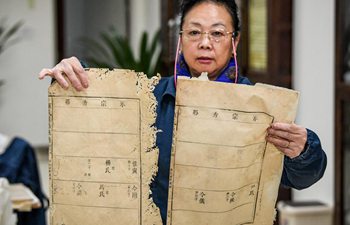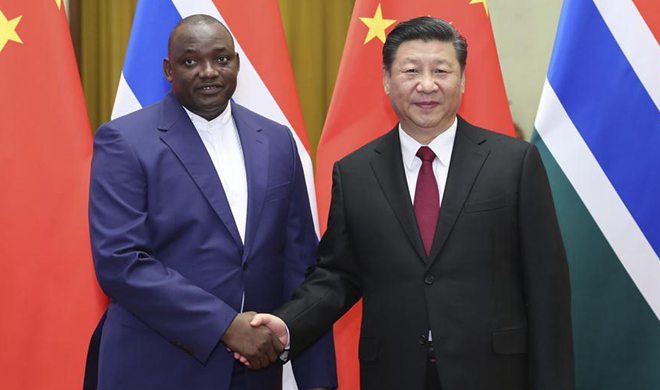by Mahmoud Darwesh and Nawas Darraji
TRIPOLI, Dec. 22 (Xinhua) -- France is mediating in the Libyan political crisis again to push the Libyan parties to accept the UN-proposed action plan that includes amendment of the current political agreement and holding elections before the end of 2018.
French Foreign Minister, Jean-Yves Le Drian, visited Libya on Thursday and met with the UN-backed prime minister, Fayez Serraj, in the capital Tripoli and the eastern-based army commander, General Khalifa Haftar, in the eastern city Benghazi.
Following meeting with Serraj, Le Drian stressed France's support for the upcoming elections and the UN-proposed road map for Libya.
Khalid Al-Muntasir, a Libyan professor of international relations, believes the French movement is not usual, but comes at a time when the international community needs to assist countries affected by the Libyan crisis.
"Everyone knows France's international importance and ability to pressure Libya parties. France has relations with the parties in the east and the west (of Libya). Therefore, the visit is to clarify Paris's position of the Libyan crisis, that it does not support any military option and that it only supports political settlement to end the years-long institutional division," Al-Muntasir told Xinhua.
"The French voice is respected by the Libyan political and military parties in Libya. Thus, the message of the French Foreign Minister following meeting with Haftar is clear," Al-Muntasir added.
A source of the municipal council of Benghazi told Xinhua that a meeting between General Haftar and Le Drian was held "to discuss the political process in Libya and the war on terrorism led by the Libyan army."
"General Haftar told Le Drian that the army will not stop fighting terrorism in all of Libya," the source said. "Le Drian informed Haftar of the international community's respect for the sacrifices of the army against terrorist groups. At the same time, Le Drian demanded the army command to respect the political process of the Libyan agreement and to work on a complete settlement with all Libyan parties."
Imad Jalul, a political analyst, believes that communication with Serraj is easier that communication with Haftar. "Unlike Serraj, Haftar is not convinced with the political process and has rejected it several times. Therefore, Paris knows that Haftar in particular must be pressured."
"France is credited for bridging the gap between Haftar and Serraj, when the two officials visited Paris and agreed on a number of significant issues, notably the elections next year and avoiding more chaos," Jalul told Xinhua.
French President Emmanuel Macron sponsored a meeting in Paris between Haftar and Serraj in June. The two officials agreed to cease-fire in all Libya and to hold presidential and parliamentary elections in 2018.
Haftar and Serraj also agreed to increase efforts against terrorism in Libya, and unite military forces in the country.
Retired army colonel, Ahmad Al-Hisnawi, fears that Haftar will not commit to the political process, stressing the importance of the international community's respect for the army's efforts against terrorism.
"Lifting the arms embargo on the army, if done by the UN Security Council, will be welcomed by the army. Therefore, the army command still doubts that some international powers are trying to keep the arms embargo, in order to give leverage to a certain political party in the country, and perhaps to recreate another political Islamist party in Libya," Al-Hisnawi told Xinhua.
General Haftar announced a few days ago that the Libyan political agreement "expired" two years after the Libyan political parties signed it.
"As of Dec. 17, 2017, the so-called political agreement expires. Therefore, all bodies resulting from this agreement automatically lost their legitimacy, which is questioned since day one," Haftar said in a televised speech.
The Head of the UN Support Mission in Libya, Ghassan Salame, urged Libyan parties to "refrain from any actions that could undermine the political process."
The UN-sponsored agreement faces controversy over articles related to the army command and the executive authority.
Salame proposed an action plan for Libya in September that includes amendment of the current political agreement and holding presidential and parliamentary elections.

















